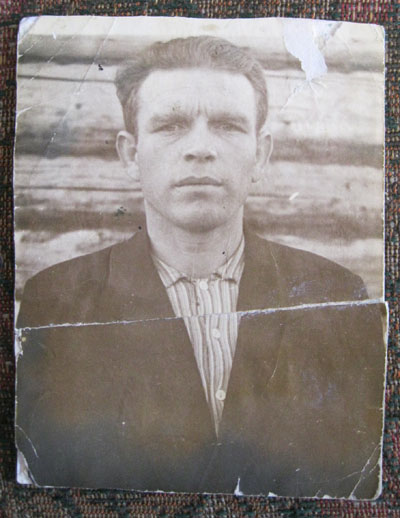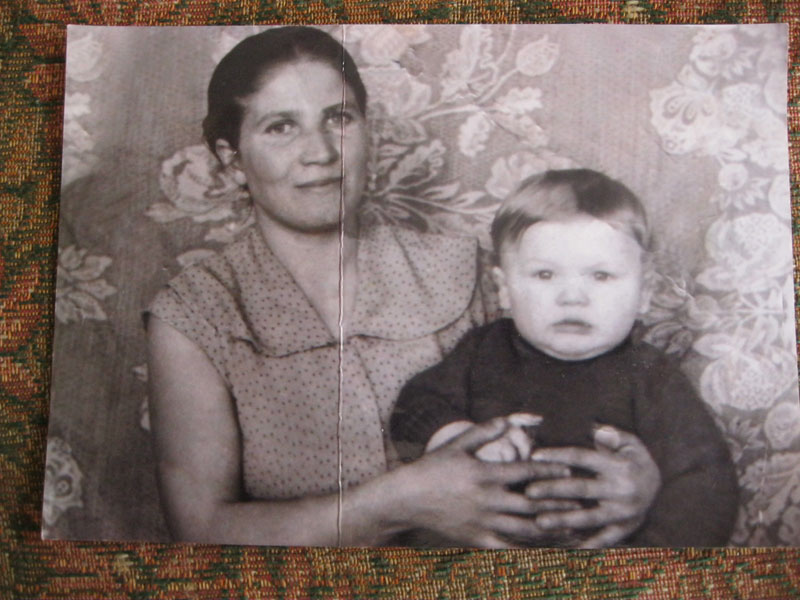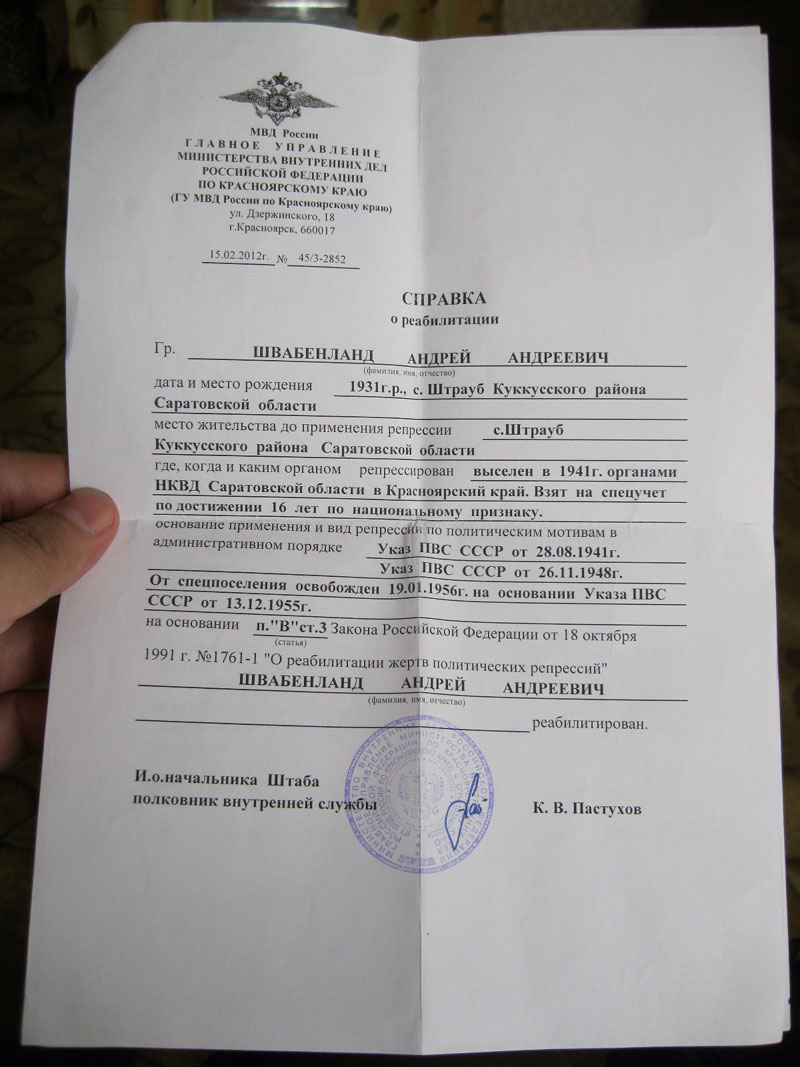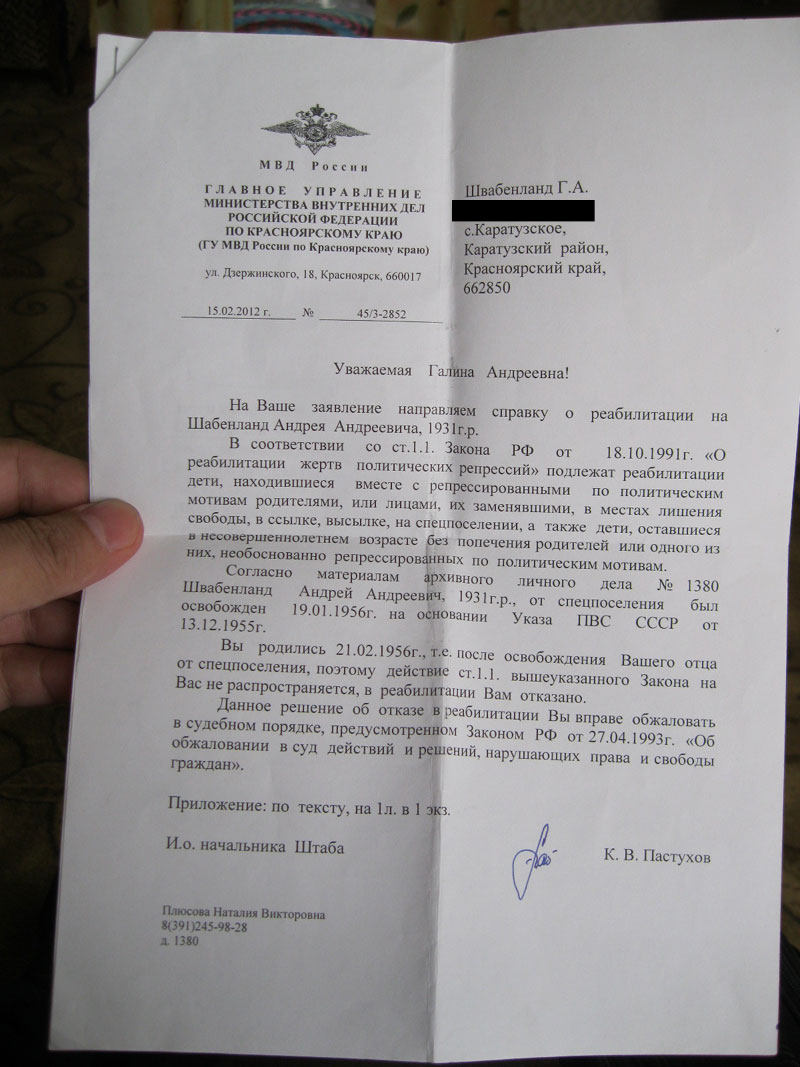









Galina Andreevna was born in the village of Nikolaevka, Karatus District, in 1956.
Father Andrei Andreevich (Genrich Genrichovich) Schwabenland, born 1931, was exiled with his parents from the hamlet of Straub, Kukkus District, Saratov Region, in 194: Genrich Genrichovich Schwabenland (born 1907), Kristina Schwabenland (Seer, born 1909).
Andrei Andreevich‘s brothers and sisters: Anna, Elsa, Frieda, Peter, Viktor, Nina. They all, except for Elsa and Peter, later left for Germany.
At first they were resettled by force in the village of Nikolaevka, behind Staraya Kop; the commandant’s office was sited in Shampurovka.
They survived the war, because they were diligent people, who were always prepared to help each other; they lived in clans. In general, you can even see nowadays, who is of German origin. Guests, who have just entered a house, say to Ivan Alexandrovich: your wife is a German. Everything looks so neat and clean.
The children were permanently visiting with grand-mother Kristina, who would feed them with all kinds of goodies – strudel, crullers and the like. And she baked little pan-cakes every day. The grandfather was working as a cattle drover. They had a big garden, the farmyard looked spotlessly clean; it was covered with grit, and everything was accurately done.
The children used to work in the fields from an early age. Once they dropped by the near-by apiary; the beekeeper invited them to eat some honey. Someone denounced him, and the beekeeper got two years for having stolen government property.
Andrei Andreevich was released from the status of a special re-settler on 19.01.1956. Galina Andreevna was born on 21.02.1956; hence, she is not covered by the area of application of the Rehabilitation Law.
At work (in a construction organization) the father was appreciated a lot, because he did a good job as a carpenter, was well versed in engineering detail drawings and was a very exact laborer in general.
The father befriended the writer Alexei Cherkassov and his wife Polina. In Karatusko, in the summertime, they used to extensively drink beer in a pub called „The Ruffian“. At home he did not speak any German, since his wife was Russian (the relatives were against – all the other children married German men or women). When he went to see his parents, however, they always communicated exclusively in German, sang German songs und observed traditions.
Andrei Andreevich died on 22nd June 1969; he perished in the river by drowning. By the way, this is the official version. According to unofficial information a couple of men celebrated the 22nd of June at the little river; they drank too much and finally came to blows. Andrei Andreevich was called a fascist and finally drowned under the influence of large amounts of alcohol.
In the 1970s numerous Germans from Karatus District moved to Kirgisia, to Frunze. Andrei Andreevich‘s parents decided to go there, too. From there many later left the country for Germany.
Godfather Vladimir Jungblut also immigrated to Germany. He lives right opposite the Brandenburg Gate; there are a lot of things there, which he does not like at all. He just left for Germany because of his children. They were in possession of a fishing license and caught a big catfish (23 kg), looking forward to fry it; but they were forced to throw the fish back into the water, as the license was valid only for catching, not for consumption. Vladimir, who, when still living in Verkhniy Kuzhebar, had taken home all fish caught in big cans, was deeply shocked and disappointed. Uncle Andrei tried to cook jam from apricots, which grow there everywhere, but he did not pay enough attention – the jam boiled over and there was a serious formation of smoke. He was fined – you can buy jam in every shop, there is no need to make it yourself. But there were also lucky moments after all. One of his relatives showed him a motorbike, which could reach a speed of 240 kilometers per hour on the motorway. Vladimir said: and what happens in case a stone lies on the roadway or you drive into a pot-hole? The person asked cannot think of why there should be a stone. How could a stone happen to get on the motorway? And even a pot-hole? Road surfacing is made up by a special layer, after all. All this is not at all easy to understand. Once Vladimir was driving out of the garage – and straight prior to this a sandblast vehicle had passed by the house. In the evening, when returning home, he detects some yellow note at the garage wall – he had been ticketed. He was supposed to have swept up all the sand opposite the driveway and take it away. The sand had now accumulated inside the tire profiles and soiled the road. Of course, all this sounds quite strange for a free Siberian man. Now the Germans start to come back because of all the refugees.
In Ivan Alexandrovich’s veins flows Polish blood; his true family name is Korotkevich, but it is mentioned and written as Karabeshko. When, in the 19th century, the suppression of the Poles set in, his grandfather, who did not only have Polish but also Kazakh blood in his veins (he was dark-skinned and black-haired), mentioned, when he was asked, Karabes (kara – black, bes – devil) as being his family name, and later this name got transferred into Korobeshko. They lived in the Bogotol District. The grandfather from his mother’s side was expropriated for being a kulak, a big farmer; we found him in the 13th volume of the Book of Memory, but unfortunately the dictaphone had already been turned off and the surname remained unrecorded in the notebook. This family branch has to be subject to some more detailed research yet.
The interview was held by Aleksei Babiy.

Andrei Andreevich Schwabenland

Andrei Andreevich‘s wife and son


Expedition of the V.P. Astafev State Pedagogic University Krasnoyarsk and the Krasnoyarsk „Memorial“-Organization on the project „Anthropologic turn in social-humanitarian sciences: Methodology of field research and practical experience in the realization of narrative interviews“ - (Sponsored by the Mikhail-Prokhorov Foundation).